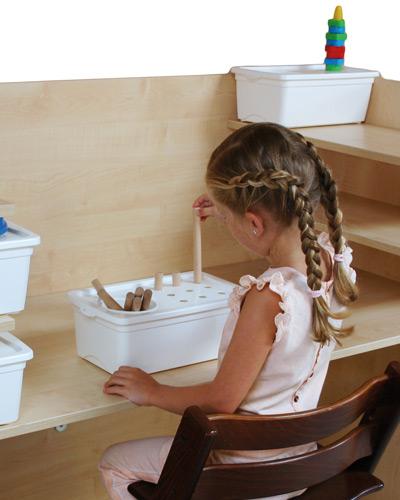Learn and develop with Nenko - Children
Children learn from the moment they are born, with a focus on different and new developments at every age. But one thing is certain, they all learn and develop! Everyone at his own rhythm and at his own level.
Development is often assessed at school on the basis of a comparison of student performance. This view, in which much is 'measured', hinders the view of the actual meaning of development. Development as a product (as a result) is less important than development as a process (the question of how a student develops or learns things).
The best example of stereotypical thinking in products or performance and how little this yields for education is asking the class 'the right answer'. Once the right answer is given, the education stops. Nothing needs to be added. A wrong answer is much more interesting for education. Something can be learned from that. It forces you to reconstruct the problem-solving process and includes absurdities, non-logical choices or choices against the rules and eventually discover why.
When you look at the basic psychological needs, people are curious and eager to learn, and look for social bonding, knowledge and skills. In motivational psychology this pursuit is also expressed in three basic psychological needs that are specific to each person: the need for relationship, the need for competence and the need for autonomy or independence. Our behavior is primarily determined by this. In this regard, children do not differ from adults.
There is nothing wrong with children who develop and learn less quickly. Children who develop less quickly are difficult to recognize in their behaviour as proactive, eager to learn, seeking competence and independence. Rather, they make a relatively passive impression, and sometimes they seem to resist. Even if you have this impression, this attitude is not always the fault of the child. What if we can offer these children tools to motivate them in the right way?
With this view of learning and development, the usual meaning of 'helping' or 'supporting' is evaluating. We are used to give children a hand when they don’t manage to realise a task, as the sense of helping. "Offering a helping hand" means literally: offering direct and concrete help or support. When we help, we often see that part of the child's task or problem is taken over. Although this is sometimes necessary, the question is what that means for the value of the development or learning. In this way we easily give children reason to assume that we are directing their development and believe that not them, but we are responsible for their development. Let's help children to help themselves.
Development and learning can’t be realised without fixed structures in time and space, without fixed links between cause and effect, goal and means, without emotional reassurance offered by 'permanent' adults or counselors. Nenko offers tools for this, with a wide range of products that contribute to the learn- and developprocess of children. Think for example about products in the self-reliance category, our large collection of task-boxes, empathy puppets as tool with communication problems or products from our communication & concentration range like the Time timers to offer just that little extra support. This is just a small selection of our large range of products.
- Team Nenko


Development is often assessed at school on the basis of a comparison of student performance. This view, in which much is 'measured', hinders the view of the actual meaning of development. Development as a product (as a result) is less important than development as a process (the question of how a student develops or learns things).
The best example of stereotypical thinking in products or performance and how little this yields for education is asking the class 'the right answer'. Once the right answer is given, the education stops. Nothing needs to be added. A wrong answer is much more interesting for education. Something can be learned from that. It forces you to reconstruct the problem-solving process and includes absurdities, non-logical choices or choices against the rules and eventually discover why.
When you look at the basic psychological needs, people are curious and eager to learn, and look for social bonding, knowledge and skills. In motivational psychology this pursuit is also expressed in three basic psychological needs that are specific to each person: the need for relationship, the need for competence and the need for autonomy or independence. Our behavior is primarily determined by this. In this regard, children do not differ from adults.
There is nothing wrong with children who develop and learn less quickly. Children who develop less quickly are difficult to recognize in their behaviour as proactive, eager to learn, seeking competence and independence. Rather, they make a relatively passive impression, and sometimes they seem to resist. Even if you have this impression, this attitude is not always the fault of the child. What if we can offer these children tools to motivate them in the right way?
With this view of learning and development, the usual meaning of 'helping' or 'supporting' is evaluating. We are used to give children a hand when they don’t manage to realise a task, as the sense of helping. "Offering a helping hand" means literally: offering direct and concrete help or support. When we help, we often see that part of the child's task or problem is taken over. Although this is sometimes necessary, the question is what that means for the value of the development or learning. In this way we easily give children reason to assume that we are directing their development and believe that not them, but we are responsible for their development. Let's help children to help themselves.
Development and learning can’t be realised without fixed structures in time and space, without fixed links between cause and effect, goal and means, without emotional reassurance offered by 'permanent' adults or counselors. Nenko offers tools for this, with a wide range of products that contribute to the learn- and developprocess of children. Think for example about products in the self-reliance category, our large collection of task-boxes, empathy puppets as tool with communication problems or products from our communication & concentration range like the Time timers to offer just that little extra support. This is just a small selection of our large range of products.
- Team Nenko












 Back
Back